PPMP20012 CQUniversity: Systems Engineering Concepts in Project
VerifiedAdded on 2023/06/13
|9
|1740
|189
Portfolio
AI Summary
This portfolio delves into the application of systems thinking and systems engineering concepts within project management. It highlights how systems thinking improves project realism, enhances integrity, and emphasizes stakeholder involvement. The portfolio explores various system thinking tools, including conceptual models and affinity diagrams, which aid project managers in identifying risks and opportunities. It further discusses the integration of systems engineering and project management, emphasizing the importance of aligning work breakdown structures and system design components. The concepts and methodologies mitigate project problems by outlining requirements, team collaboration, and effective communication. The learning experience underscores the significance of planning, design, execution, and implementation in project realization, relating project-based workflow to systems thinking and engineering. It concludes by acknowledging inhibitors to project success, such as poor planning and resource management, and the role of application systems in organizing project activities. Desklib provides access to similar solved assignments and resources for students.
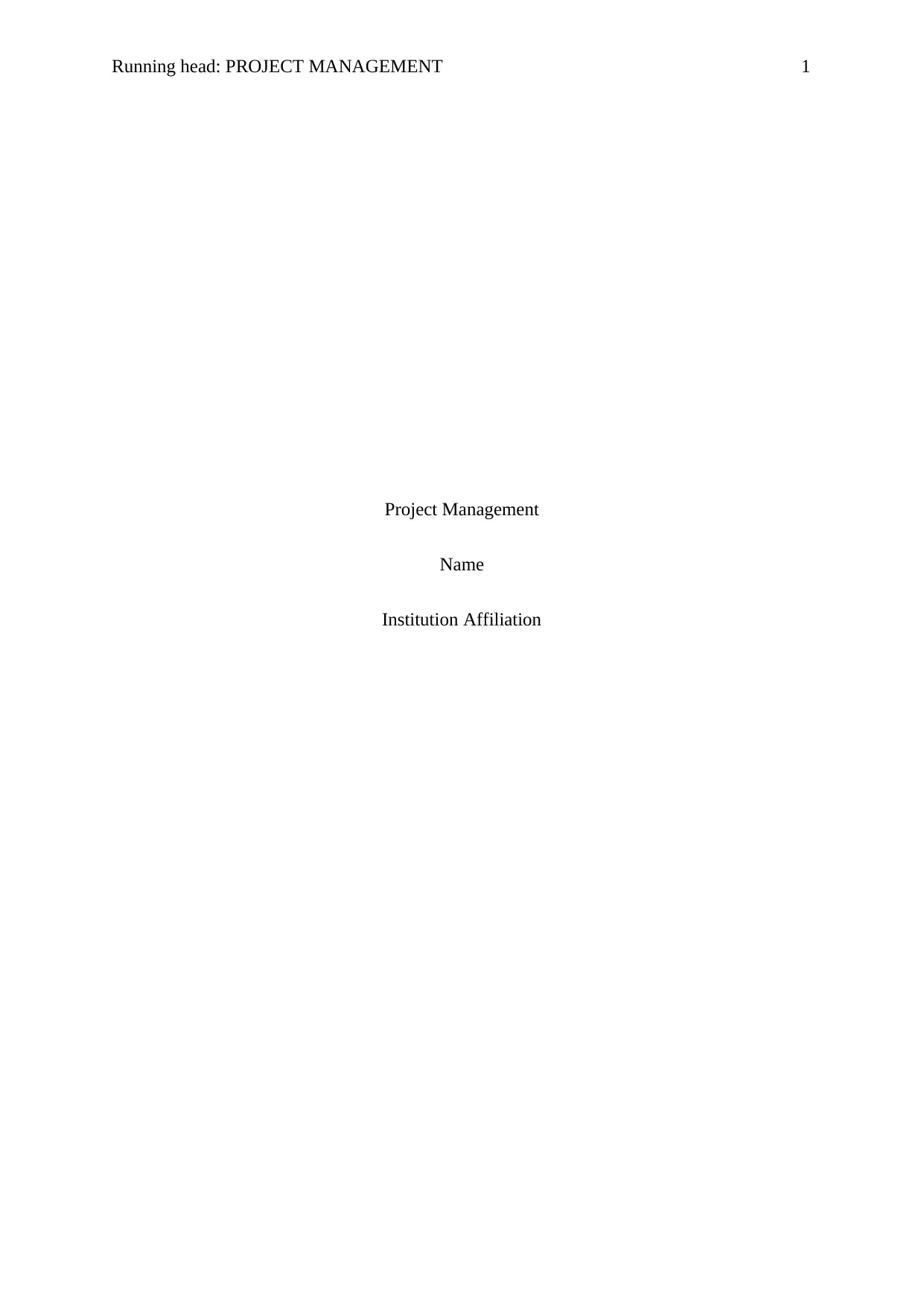
Running head: PROJECT MANAGEMENT 1
Project Management
Name
Institution Affiliation
Project Management
Name
Institution Affiliation
Paraphrase This Document
Need a fresh take? Get an instant paraphrase of this document with our AI Paraphraser
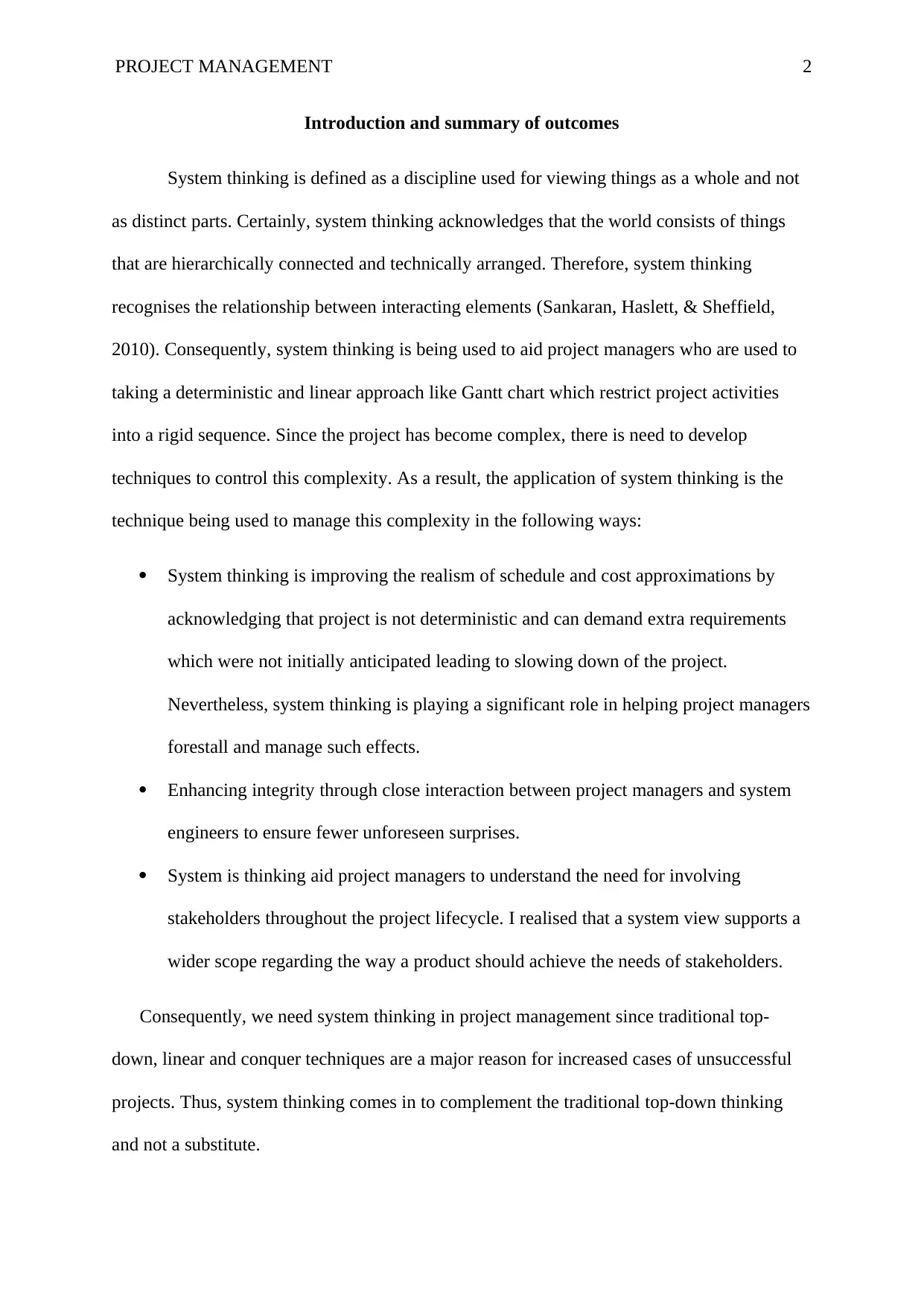
PROJECT MANAGEMENT 2
Introduction and summary of outcomes
System thinking is defined as a discipline used for viewing things as a whole and not
as distinct parts. Certainly, system thinking acknowledges that the world consists of things
that are hierarchically connected and technically arranged. Therefore, system thinking
recognises the relationship between interacting elements (Sankaran, Haslett, & Sheffield,
2010). Consequently, system thinking is being used to aid project managers who are used to
taking a deterministic and linear approach like Gantt chart which restrict project activities
into a rigid sequence. Since the project has become complex, there is need to develop
techniques to control this complexity. As a result, the application of system thinking is the
technique being used to manage this complexity in the following ways:
System thinking is improving the realism of schedule and cost approximations by
acknowledging that project is not deterministic and can demand extra requirements
which were not initially anticipated leading to slowing down of the project.
Nevertheless, system thinking is playing a significant role in helping project managers
forestall and manage such effects.
Enhancing integrity through close interaction between project managers and system
engineers to ensure fewer unforeseen surprises.
System is thinking aid project managers to understand the need for involving
stakeholders throughout the project lifecycle. I realised that a system view supports a
wider scope regarding the way a product should achieve the needs of stakeholders.
Consequently, we need system thinking in project management since traditional top-
down, linear and conquer techniques are a major reason for increased cases of unsuccessful
projects. Thus, system thinking comes in to complement the traditional top-down thinking
and not a substitute.
Introduction and summary of outcomes
System thinking is defined as a discipline used for viewing things as a whole and not
as distinct parts. Certainly, system thinking acknowledges that the world consists of things
that are hierarchically connected and technically arranged. Therefore, system thinking
recognises the relationship between interacting elements (Sankaran, Haslett, & Sheffield,
2010). Consequently, system thinking is being used to aid project managers who are used to
taking a deterministic and linear approach like Gantt chart which restrict project activities
into a rigid sequence. Since the project has become complex, there is need to develop
techniques to control this complexity. As a result, the application of system thinking is the
technique being used to manage this complexity in the following ways:
System thinking is improving the realism of schedule and cost approximations by
acknowledging that project is not deterministic and can demand extra requirements
which were not initially anticipated leading to slowing down of the project.
Nevertheless, system thinking is playing a significant role in helping project managers
forestall and manage such effects.
Enhancing integrity through close interaction between project managers and system
engineers to ensure fewer unforeseen surprises.
System is thinking aid project managers to understand the need for involving
stakeholders throughout the project lifecycle. I realised that a system view supports a
wider scope regarding the way a product should achieve the needs of stakeholders.
Consequently, we need system thinking in project management since traditional top-
down, linear and conquer techniques are a major reason for increased cases of unsuccessful
projects. Thus, system thinking comes in to complement the traditional top-down thinking
and not a substitute.
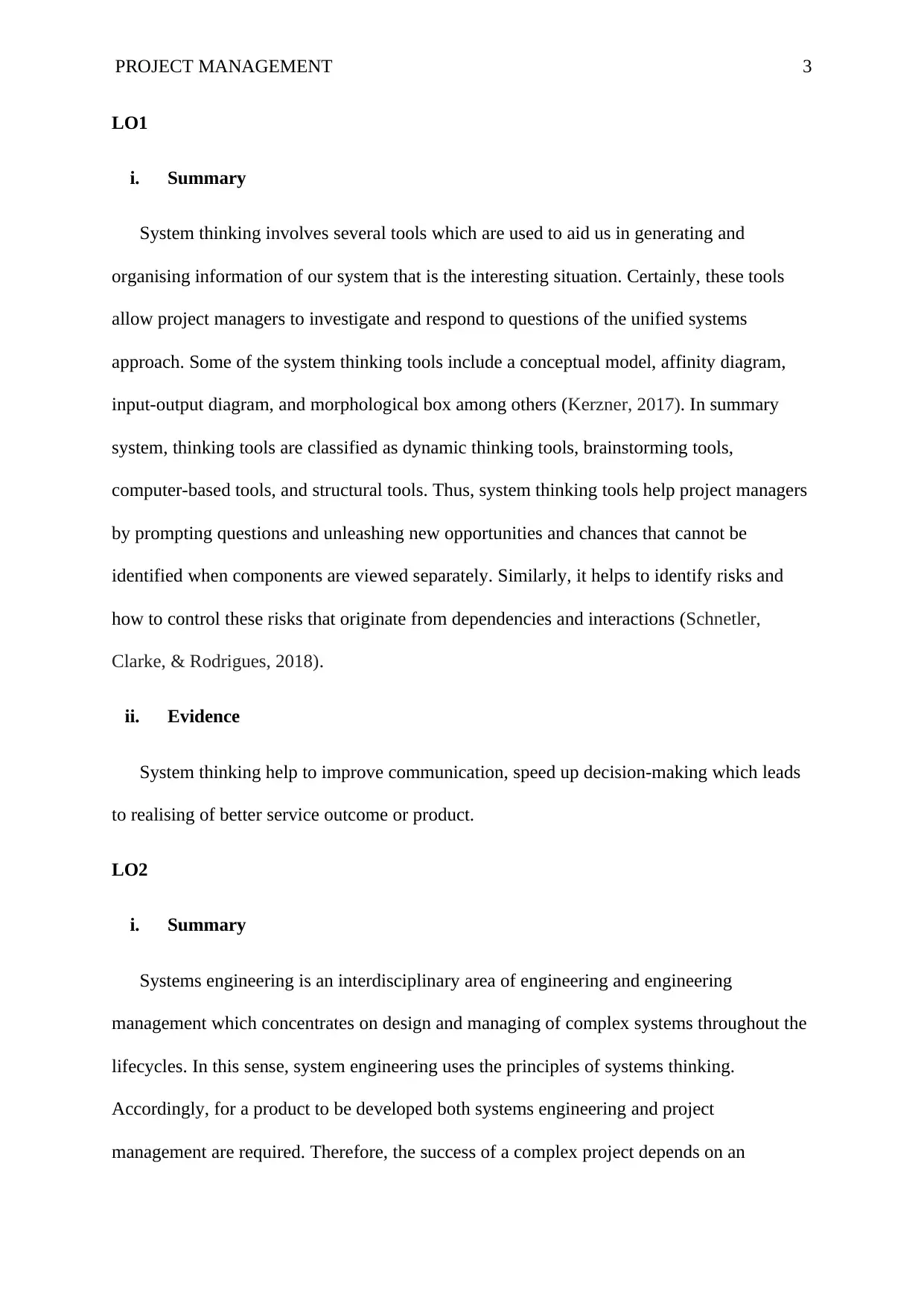
PROJECT MANAGEMENT 3
LO1
i. Summary
System thinking involves several tools which are used to aid us in generating and
organising information of our system that is the interesting situation. Certainly, these tools
allow project managers to investigate and respond to questions of the unified systems
approach. Some of the system thinking tools include a conceptual model, affinity diagram,
input-output diagram, and morphological box among others (Kerzner, 2017). In summary
system, thinking tools are classified as dynamic thinking tools, brainstorming tools,
computer-based tools, and structural tools. Thus, system thinking tools help project managers
by prompting questions and unleashing new opportunities and chances that cannot be
identified when components are viewed separately. Similarly, it helps to identify risks and
how to control these risks that originate from dependencies and interactions (Schnetler,
Clarke, & Rodrigues, 2018).
ii. Evidence
System thinking help to improve communication, speed up decision-making which leads
to realising of better service outcome or product.
LO2
i. Summary
Systems engineering is an interdisciplinary area of engineering and engineering
management which concentrates on design and managing of complex systems throughout the
lifecycles. In this sense, system engineering uses the principles of systems thinking.
Accordingly, for a product to be developed both systems engineering and project
management are required. Therefore, the success of a complex project depends on an
LO1
i. Summary
System thinking involves several tools which are used to aid us in generating and
organising information of our system that is the interesting situation. Certainly, these tools
allow project managers to investigate and respond to questions of the unified systems
approach. Some of the system thinking tools include a conceptual model, affinity diagram,
input-output diagram, and morphological box among others (Kerzner, 2017). In summary
system, thinking tools are classified as dynamic thinking tools, brainstorming tools,
computer-based tools, and structural tools. Thus, system thinking tools help project managers
by prompting questions and unleashing new opportunities and chances that cannot be
identified when components are viewed separately. Similarly, it helps to identify risks and
how to control these risks that originate from dependencies and interactions (Schnetler,
Clarke, & Rodrigues, 2018).
ii. Evidence
System thinking help to improve communication, speed up decision-making which leads
to realising of better service outcome or product.
LO2
i. Summary
Systems engineering is an interdisciplinary area of engineering and engineering
management which concentrates on design and managing of complex systems throughout the
lifecycles. In this sense, system engineering uses the principles of systems thinking.
Accordingly, for a product to be developed both systems engineering and project
management are required. Therefore, the success of a complex project depends on an
⊘ This is a preview!⊘
Do you want full access?
Subscribe today to unlock all pages.

Trusted by 1+ million students worldwide
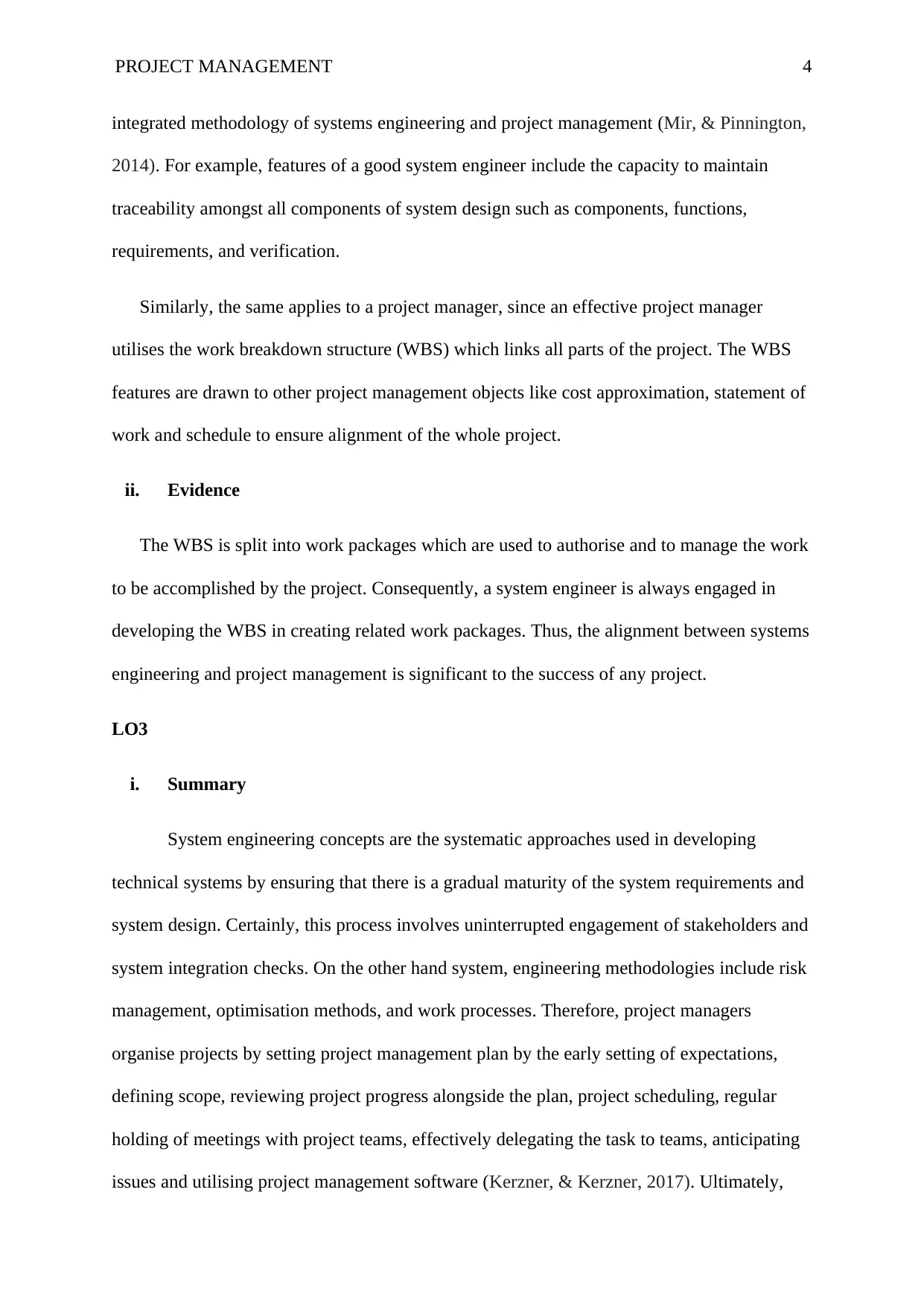
PROJECT MANAGEMENT 4
integrated methodology of systems engineering and project management (Mir, & Pinnington,
2014). For example, features of a good system engineer include the capacity to maintain
traceability amongst all components of system design such as components, functions,
requirements, and verification.
Similarly, the same applies to a project manager, since an effective project manager
utilises the work breakdown structure (WBS) which links all parts of the project. The WBS
features are drawn to other project management objects like cost approximation, statement of
work and schedule to ensure alignment of the whole project.
ii. Evidence
The WBS is split into work packages which are used to authorise and to manage the work
to be accomplished by the project. Consequently, a system engineer is always engaged in
developing the WBS in creating related work packages. Thus, the alignment between systems
engineering and project management is significant to the success of any project.
LO3
i. Summary
System engineering concepts are the systematic approaches used in developing
technical systems by ensuring that there is a gradual maturity of the system requirements and
system design. Certainly, this process involves uninterrupted engagement of stakeholders and
system integration checks. On the other hand system, engineering methodologies include risk
management, optimisation methods, and work processes. Therefore, project managers
organise projects by setting project management plan by the early setting of expectations,
defining scope, reviewing project progress alongside the plan, project scheduling, regular
holding of meetings with project teams, effectively delegating the task to teams, anticipating
issues and utilising project management software (Kerzner, & Kerzner, 2017). Ultimately,
integrated methodology of systems engineering and project management (Mir, & Pinnington,
2014). For example, features of a good system engineer include the capacity to maintain
traceability amongst all components of system design such as components, functions,
requirements, and verification.
Similarly, the same applies to a project manager, since an effective project manager
utilises the work breakdown structure (WBS) which links all parts of the project. The WBS
features are drawn to other project management objects like cost approximation, statement of
work and schedule to ensure alignment of the whole project.
ii. Evidence
The WBS is split into work packages which are used to authorise and to manage the work
to be accomplished by the project. Consequently, a system engineer is always engaged in
developing the WBS in creating related work packages. Thus, the alignment between systems
engineering and project management is significant to the success of any project.
LO3
i. Summary
System engineering concepts are the systematic approaches used in developing
technical systems by ensuring that there is a gradual maturity of the system requirements and
system design. Certainly, this process involves uninterrupted engagement of stakeholders and
system integration checks. On the other hand system, engineering methodologies include risk
management, optimisation methods, and work processes. Therefore, project managers
organise projects by setting project management plan by the early setting of expectations,
defining scope, reviewing project progress alongside the plan, project scheduling, regular
holding of meetings with project teams, effectively delegating the task to teams, anticipating
issues and utilising project management software (Kerzner, & Kerzner, 2017). Ultimately,
Paraphrase This Document
Need a fresh take? Get an instant paraphrase of this document with our AI Paraphraser
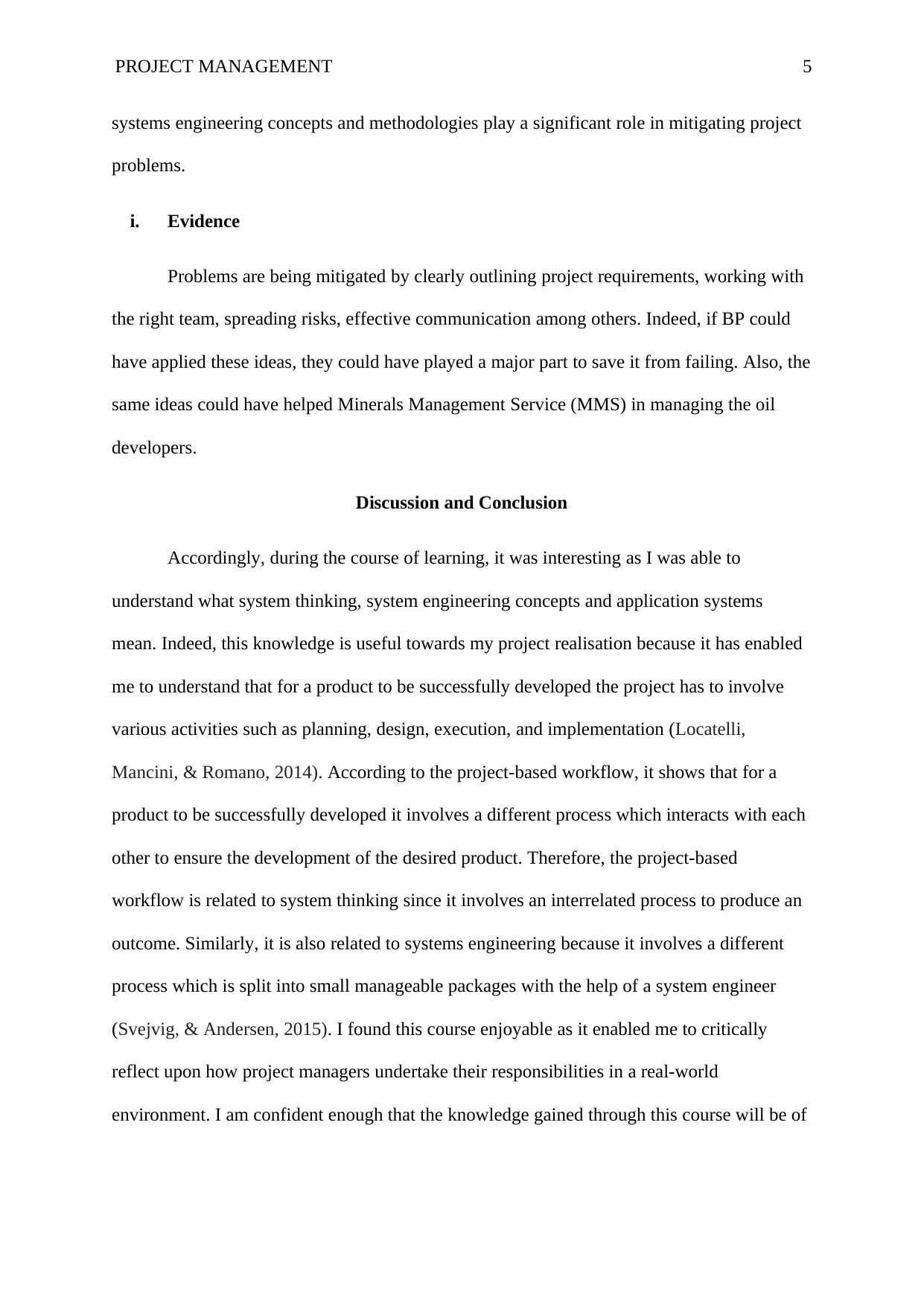
PROJECT MANAGEMENT 5
systems engineering concepts and methodologies play a significant role in mitigating project
problems.
i. Evidence
Problems are being mitigated by clearly outlining project requirements, working with
the right team, spreading risks, effective communication among others. Indeed, if BP could
have applied these ideas, they could have played a major part to save it from failing. Also, the
same ideas could have helped Minerals Management Service (MMS) in managing the oil
developers.
Discussion and Conclusion
Accordingly, during the course of learning, it was interesting as I was able to
understand what system thinking, system engineering concepts and application systems
mean. Indeed, this knowledge is useful towards my project realisation because it has enabled
me to understand that for a product to be successfully developed the project has to involve
various activities such as planning, design, execution, and implementation (Locatelli,
Mancini, & Romano, 2014). According to the project-based workflow, it shows that for a
product to be successfully developed it involves a different process which interacts with each
other to ensure the development of the desired product. Therefore, the project-based
workflow is related to system thinking since it involves an interrelated process to produce an
outcome. Similarly, it is also related to systems engineering because it involves a different
process which is split into small manageable packages with the help of a system engineer
(Svejvig, & Andersen, 2015). I found this course enjoyable as it enabled me to critically
reflect upon how project managers undertake their responsibilities in a real-world
environment. I am confident enough that the knowledge gained through this course will be of
systems engineering concepts and methodologies play a significant role in mitigating project
problems.
i. Evidence
Problems are being mitigated by clearly outlining project requirements, working with
the right team, spreading risks, effective communication among others. Indeed, if BP could
have applied these ideas, they could have played a major part to save it from failing. Also, the
same ideas could have helped Minerals Management Service (MMS) in managing the oil
developers.
Discussion and Conclusion
Accordingly, during the course of learning, it was interesting as I was able to
understand what system thinking, system engineering concepts and application systems
mean. Indeed, this knowledge is useful towards my project realisation because it has enabled
me to understand that for a product to be successfully developed the project has to involve
various activities such as planning, design, execution, and implementation (Locatelli,
Mancini, & Romano, 2014). According to the project-based workflow, it shows that for a
product to be successfully developed it involves a different process which interacts with each
other to ensure the development of the desired product. Therefore, the project-based
workflow is related to system thinking since it involves an interrelated process to produce an
outcome. Similarly, it is also related to systems engineering because it involves a different
process which is split into small manageable packages with the help of a system engineer
(Svejvig, & Andersen, 2015). I found this course enjoyable as it enabled me to critically
reflect upon how project managers undertake their responsibilities in a real-world
environment. I am confident enough that the knowledge gained through this course will be of
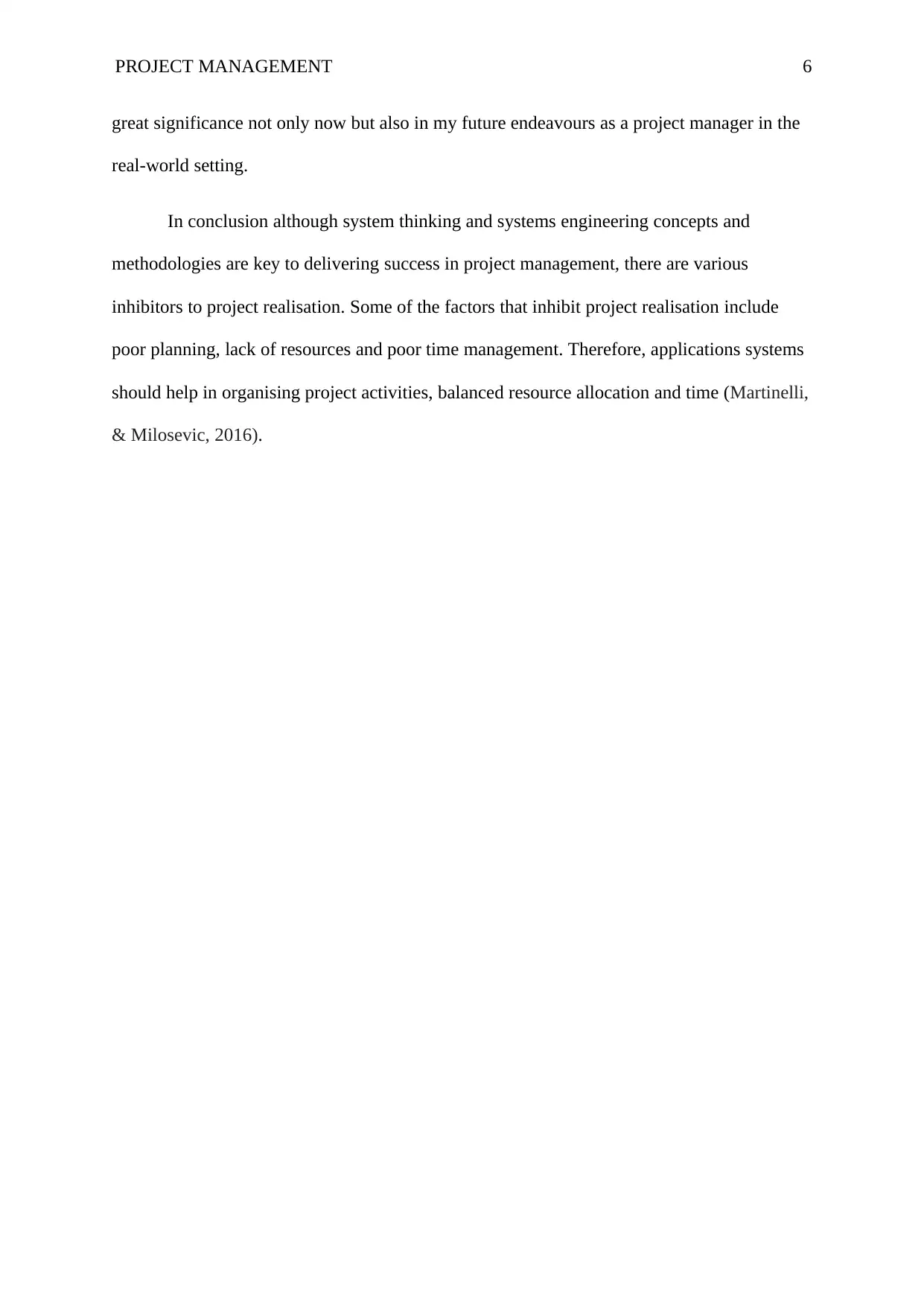
PROJECT MANAGEMENT 6
great significance not only now but also in my future endeavours as a project manager in the
real-world setting.
In conclusion although system thinking and systems engineering concepts and
methodologies are key to delivering success in project management, there are various
inhibitors to project realisation. Some of the factors that inhibit project realisation include
poor planning, lack of resources and poor time management. Therefore, applications systems
should help in organising project activities, balanced resource allocation and time (Martinelli,
& Milosevic, 2016).
great significance not only now but also in my future endeavours as a project manager in the
real-world setting.
In conclusion although system thinking and systems engineering concepts and
methodologies are key to delivering success in project management, there are various
inhibitors to project realisation. Some of the factors that inhibit project realisation include
poor planning, lack of resources and poor time management. Therefore, applications systems
should help in organising project activities, balanced resource allocation and time (Martinelli,
& Milosevic, 2016).
⊘ This is a preview!⊘
Do you want full access?
Subscribe today to unlock all pages.

Trusted by 1+ million students worldwide
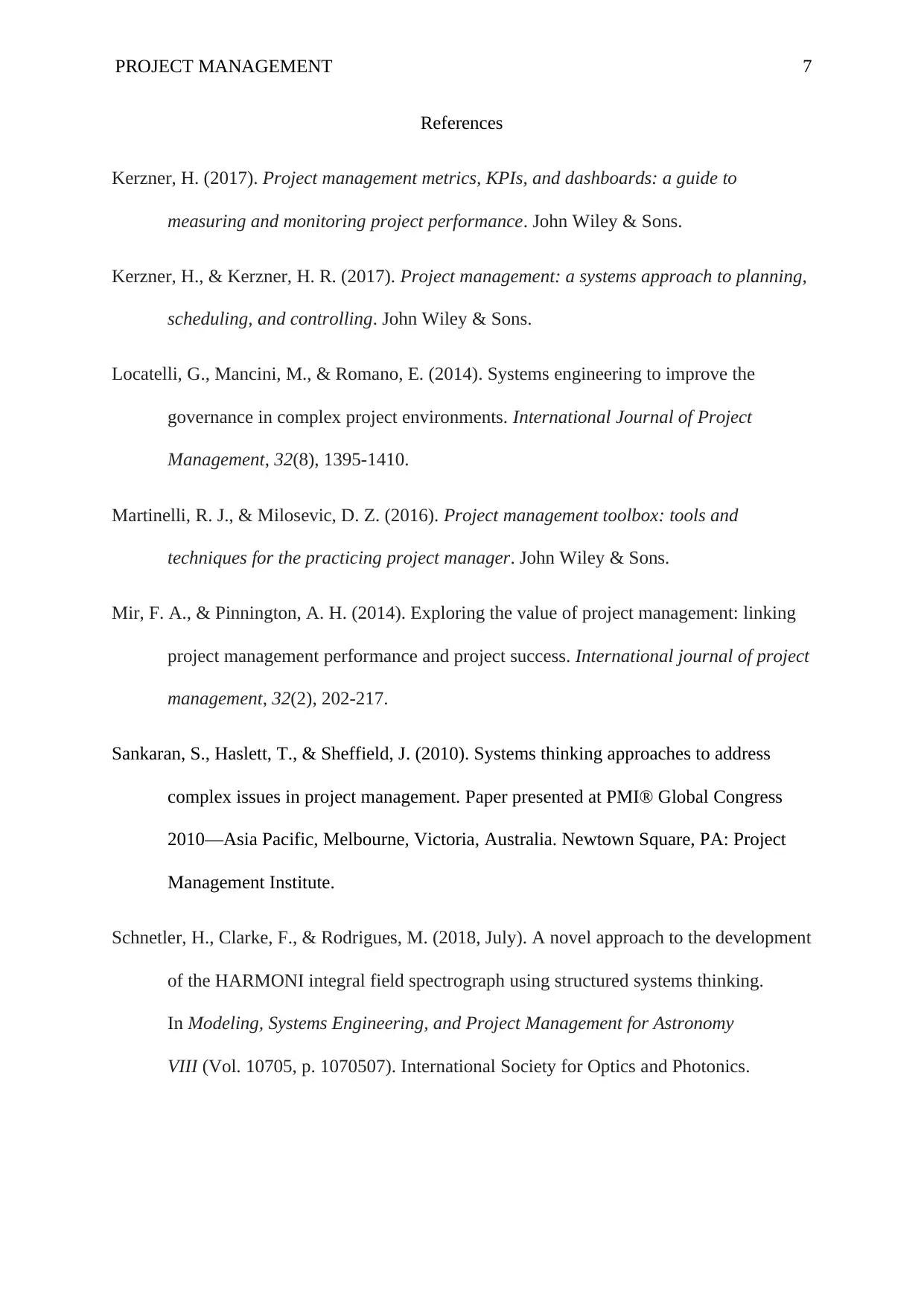
PROJECT MANAGEMENT 7
References
Kerzner, H. (2017). Project management metrics, KPIs, and dashboards: a guide to
measuring and monitoring project performance. John Wiley & Sons.
Kerzner, H., & Kerzner, H. R. (2017). Project management: a systems approach to planning,
scheduling, and controlling. John Wiley & Sons.
Locatelli, G., Mancini, M., & Romano, E. (2014). Systems engineering to improve the
governance in complex project environments. International Journal of Project
Management, 32(8), 1395-1410.
Martinelli, R. J., & Milosevic, D. Z. (2016). Project management toolbox: tools and
techniques for the practicing project manager. John Wiley & Sons.
Mir, F. A., & Pinnington, A. H. (2014). Exploring the value of project management: linking
project management performance and project success. International journal of project
management, 32(2), 202-217.
Sankaran, S., Haslett, T., & Sheffield, J. (2010). Systems thinking approaches to address
complex issues in project management. Paper presented at PMI® Global Congress
2010—Asia Pacific, Melbourne, Victoria, Australia. Newtown Square, PA: Project
Management Institute.
Schnetler, H., Clarke, F., & Rodrigues, M. (2018, July). A novel approach to the development
of the HARMONI integral field spectrograph using structured systems thinking.
In Modeling, Systems Engineering, and Project Management for Astronomy
VIII (Vol. 10705, p. 1070507). International Society for Optics and Photonics.
References
Kerzner, H. (2017). Project management metrics, KPIs, and dashboards: a guide to
measuring and monitoring project performance. John Wiley & Sons.
Kerzner, H., & Kerzner, H. R. (2017). Project management: a systems approach to planning,
scheduling, and controlling. John Wiley & Sons.
Locatelli, G., Mancini, M., & Romano, E. (2014). Systems engineering to improve the
governance in complex project environments. International Journal of Project
Management, 32(8), 1395-1410.
Martinelli, R. J., & Milosevic, D. Z. (2016). Project management toolbox: tools and
techniques for the practicing project manager. John Wiley & Sons.
Mir, F. A., & Pinnington, A. H. (2014). Exploring the value of project management: linking
project management performance and project success. International journal of project
management, 32(2), 202-217.
Sankaran, S., Haslett, T., & Sheffield, J. (2010). Systems thinking approaches to address
complex issues in project management. Paper presented at PMI® Global Congress
2010—Asia Pacific, Melbourne, Victoria, Australia. Newtown Square, PA: Project
Management Institute.
Schnetler, H., Clarke, F., & Rodrigues, M. (2018, July). A novel approach to the development
of the HARMONI integral field spectrograph using structured systems thinking.
In Modeling, Systems Engineering, and Project Management for Astronomy
VIII (Vol. 10705, p. 1070507). International Society for Optics and Photonics.
Paraphrase This Document
Need a fresh take? Get an instant paraphrase of this document with our AI Paraphraser

PROJECT MANAGEMENT 8
Svejvig, P., & Andersen, P. (2015). Rethinking project management: A structured literature
review with a critical look at the brave new world. International Journal of Project
Management, 33(2), 278-290.
Svejvig, P., & Andersen, P. (2015). Rethinking project management: A structured literature
review with a critical look at the brave new world. International Journal of Project
Management, 33(2), 278-290.
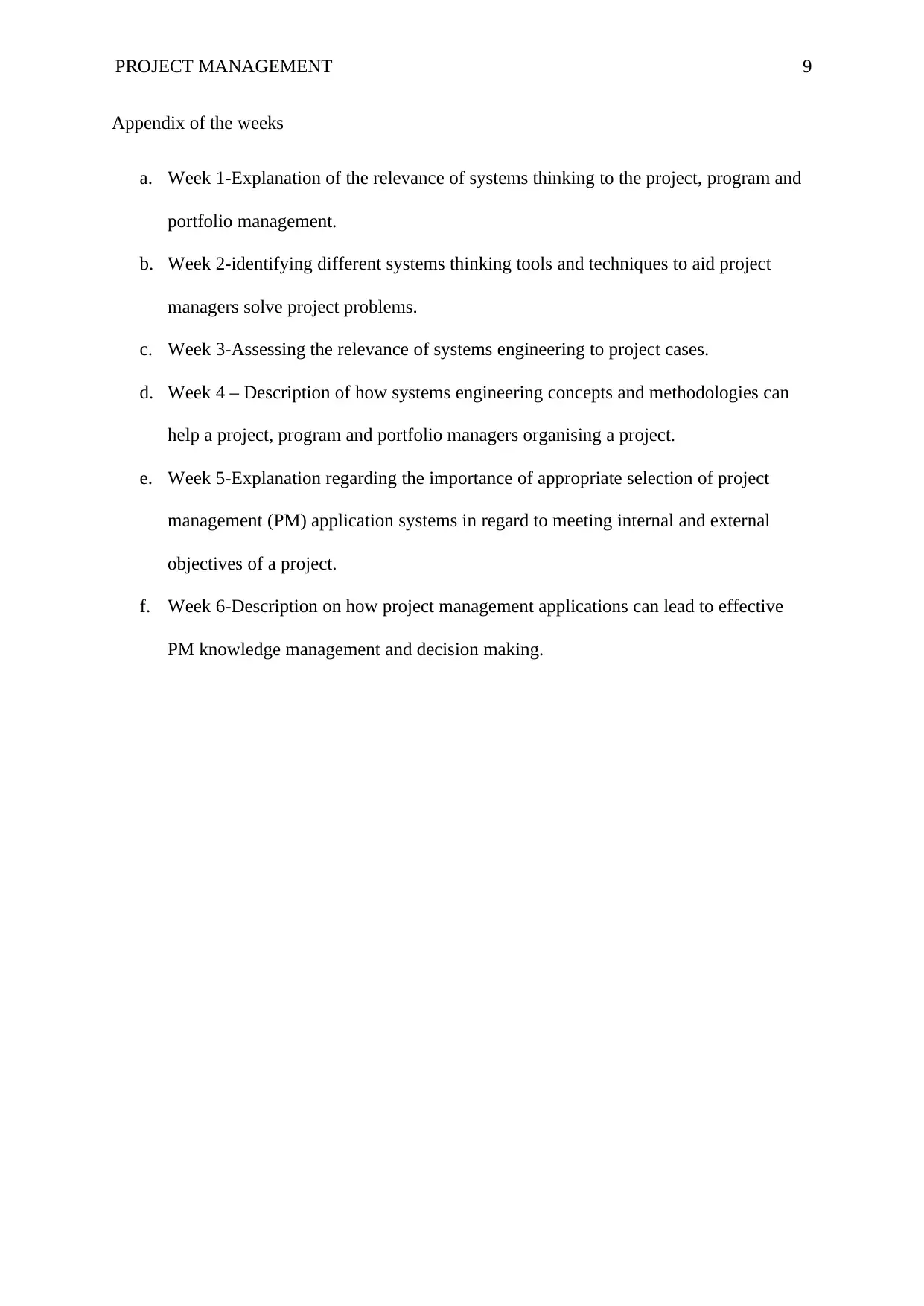
PROJECT MANAGEMENT 9
Appendix of the weeks
a. Week 1-Explanation of the relevance of systems thinking to the project, program and
portfolio management.
b. Week 2-identifying different systems thinking tools and techniques to aid project
managers solve project problems.
c. Week 3-Assessing the relevance of systems engineering to project cases.
d. Week 4 – Description of how systems engineering concepts and methodologies can
help a project, program and portfolio managers organising a project.
e. Week 5-Explanation regarding the importance of appropriate selection of project
management (PM) application systems in regard to meeting internal and external
objectives of a project.
f. Week 6-Description on how project management applications can lead to effective
PM knowledge management and decision making.
Appendix of the weeks
a. Week 1-Explanation of the relevance of systems thinking to the project, program and
portfolio management.
b. Week 2-identifying different systems thinking tools and techniques to aid project
managers solve project problems.
c. Week 3-Assessing the relevance of systems engineering to project cases.
d. Week 4 – Description of how systems engineering concepts and methodologies can
help a project, program and portfolio managers organising a project.
e. Week 5-Explanation regarding the importance of appropriate selection of project
management (PM) application systems in regard to meeting internal and external
objectives of a project.
f. Week 6-Description on how project management applications can lead to effective
PM knowledge management and decision making.
⊘ This is a preview!⊘
Do you want full access?
Subscribe today to unlock all pages.

Trusted by 1+ million students worldwide
1 out of 9
Related Documents
Your All-in-One AI-Powered Toolkit for Academic Success.
+13062052269
info@desklib.com
Available 24*7 on WhatsApp / Email
![[object Object]](/_next/static/media/star-bottom.7253800d.svg)
Unlock your academic potential
Copyright © 2020–2026 A2Z Services. All Rights Reserved. Developed and managed by ZUCOL.




